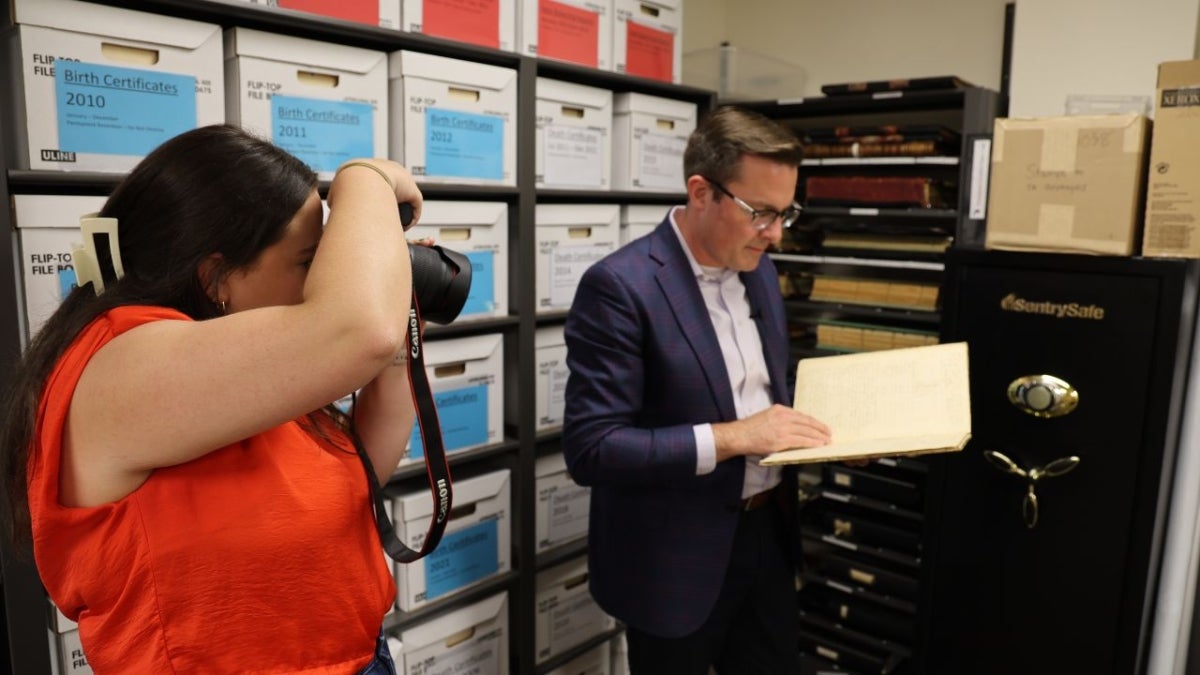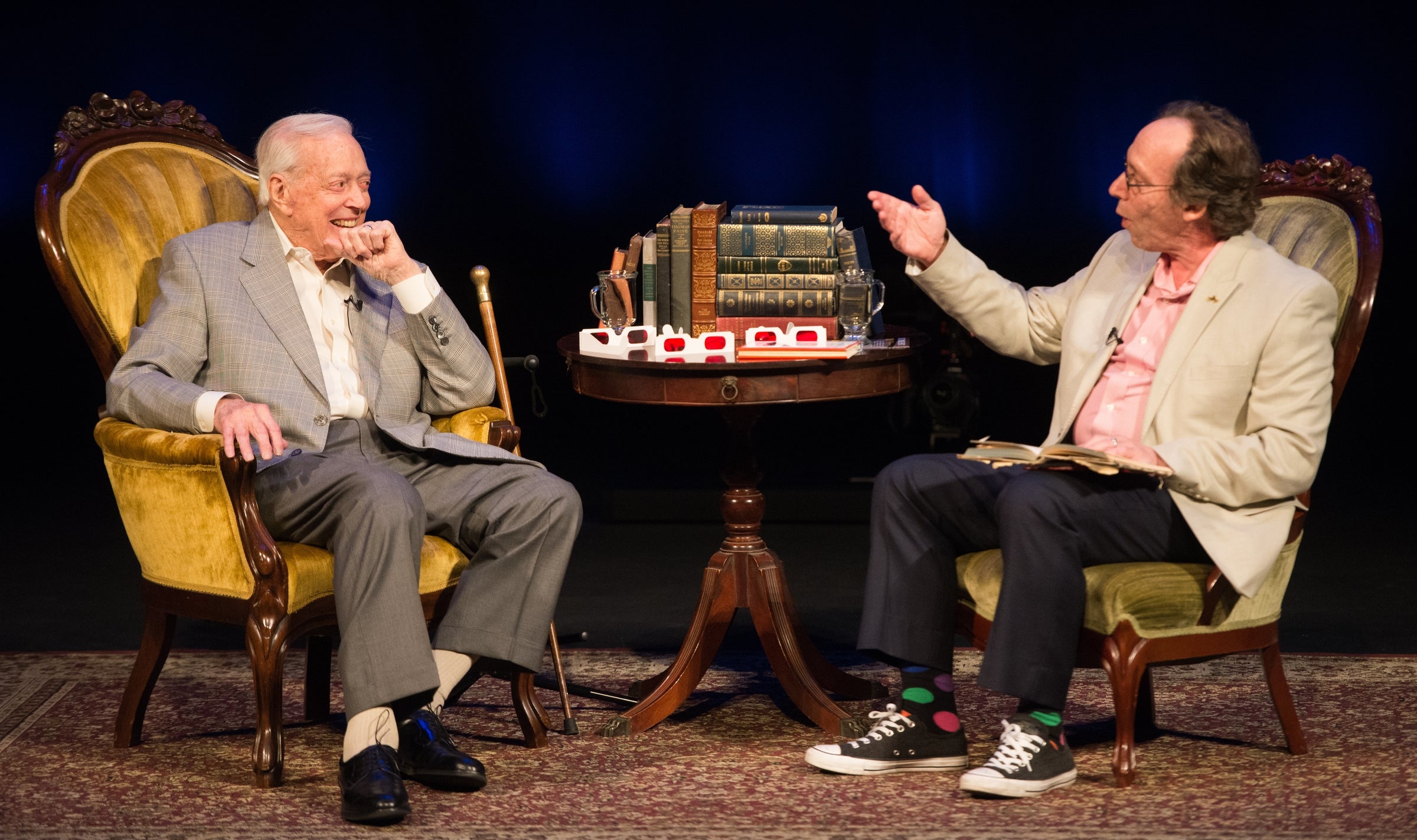A theoretical physicist and a television host sit down and talk about sex, religion, news, science, Pope Francis, Donald Trump, and Ike’s post-presidential golf game.
Rather than a bar joke, that was Tuesday night’s result of the latest in Arizona State University’s Origins Project dialogues, a series of freewheeling conversations between theoretical astrophysicist Lawrence Krauss and a variety of thinkers on humankind’s fundamental questions, and sometimes just funny stories.
Television legend and Emmy Award winner Hugh Downs joined KraussKrauss is also Foundation Professor of the School of Earth and Space Exploration, which is an academic unit of the College of Liberal Arts and Sciences., director of the Origins Project, for “An Origins Project Dialogue, Seventy Years of Life on TV: Politics, Religion, Sex and Science” at the Scottsdale Center for the Performing Arts.
Downs turned 95 on Feb. 14. “My higher education has never ended,” he said. “It’s gone from one thing to another.” In addition to being one of the most familiar figures in the history of television, Downs has written a cello concerto, earned his private pilot’s license and written a paper on astrophysics.
Emmy Award winner Hugh Downs (left) and ASU theoretical astrophysicist Lawrence Krauss discuss sex, media, politics and more Tuesday night at the Scottsdale Center for the Performing Arts as part of “An Origins Project Dialogue, Seventy Years of Life on TV: Politics, Religion, Sex and Science.” Photos by Ben Moffat/ASU Now
His career began by accident. During the Depression, Downs’ father told him he had to get a job. As he walked past the local radio station, he decided to go in and see if they had any openings. The station manager told him he’d give him a tryout on the spot. After Downs read an ad for a paint store, the manager told him, “That was really bad, but great oaks from little acorns grow.”
“Tonight we’re going to talk about all the things you can’t talk about on TV,” Krauss said.
On religion:
“When they tell me they talk to God, I think they’re making a prayer,” Downs said. “When they tell me God talks to them, I go on full alert.”
Krauss reminded Downs of a quote Downs once said about going to church every Sunday: “The stories are so silly they have to go to church every Sunday so eventually they’ll believe them.”
“We ought to have quantum physics classes every Sunday, so maybe that’ll sink in,” Krauss said.
Downs said he would like to interview Pope Francis. “He has the courage of an elephant,” Downs said.
On politics:
Downs talked about interviewing Dwight D. Eisenhower after his presidency. What was the biggest difference? “A lot more people beat me at golf now,” Eisenhower said.
“You have an historical perspective about the way elections are done,” Krauss said.
Downs referred to the broad field of Republican candidates in the current race. “You worry that someone out of that lineup might end up running the country who isn’t qualified,” he said.
Downs described a lunch meeting he had with Donald Trump once. Trump wanted the air rights over the midtown Manhattan church where Downs was a vestryman.

A portion on the stage backdrop and flier had 3-D elements, prompting Downs (top photo) and members of the audience to don special glasses.
“He offered me an obscene amount of money,” Downs said. “He kept upping the ante.” Downs refused, saying if the idea had merit he would vote for it anyway. “He seemed to go away dismayed because he’d met someone who couldn’t be bought.”
On sex:
Krauss brought up Janet Jackson’s loss of control over her clothes during the Super Bowl halftime show in 2004 and the FCC fines levied on broadcasters over obscenity charges.
“It seems to me people have breasts,” Krauss said. “But every night there’s six ‘Law & Orders’ with people getting stabbed in the eye. … It’s obscene to me.”
On journalism:
“There has been a tremendous change in what we would call news since you began,” Krauss said, citing the 24-hour news cycle. “It becomes entertainment; you have to compete.”
“Fox News is an oxymoron,” Downs said.
“He has the courage of an elephant.”
— Hugh Downs, on Pope Francis
Krauss asked Downs if he’d ever chosen stories for ratings or because they were salacious. “That’s all right,” Downs said. “I don’t think there’s anything wrong with that, as long as the facts are right.”
On science:
On Downs’ bucket list: “I want to go up to the International Space Station and float around.”
He asked Krauss, “How do you get across tough things like higher math so the public understands it?”
“All of us learn things,” Krauss said, adding if you want to find out how much you don’t know about something, try writing about it. “The answers are not as interesting as the questions.”
“The more you know, the more you expand the periphery of your ignorance,” Downs said.
“My futures are depressing, but yours never are,” Krauss said.
More Law, journalism and politics

Native Vote works to ensure the right to vote for Arizona's Native Americans
The Navajo Nation is in a remote area of northeastern Arizona, far away from the hustle of urban life. The 27,400-acre reservation is home to the Canyon de Chelly National Monument and…

New report documents Latinos’ critical roles in AI
According to a new report that traces the important role Latinos are playing in the growth of artificial intelligence technology across the country, Latinos are early adopters of AI.The 2024 Latino…

ASU's Carnegie-Knight News21 project examines the state of American democracy
In the latest project of Carnegie-Knight News21, a national reporting initiative and fellowship headquartered at Arizona State University’s Walter Cronkite School of Journalism and Mass Communication…

